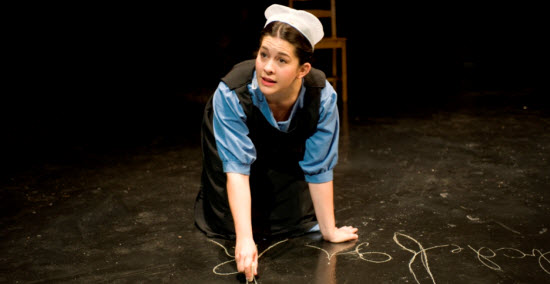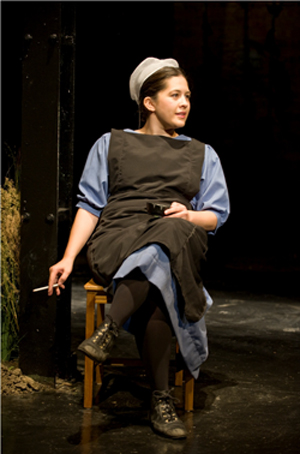After slaughter and heartbreak, radiant grace
 Review: “The Amish Project” by Jessica Dickey, at American Theater Company. Closed Oct. 30 *****
Review: “The Amish Project” by Jessica Dickey, at American Theater Company. Closed Oct. 30 *****
By Lawrence B. Johnson
It would be easy to overlook the little play with the unprepossessing title at American Theater Company. But for anyone who loves theater, missing “The Amish Project,” playwright Jessica Dickey’s one-woman show about tragedy and the gift of forgiveness, would be the mistake of the year.
 The event on which Dickey based her play is historical and grisly. On Oct. 2, 2006, Charles Roberts, a milk truck driver whose route took in the Amish village of Nickel Mines, Pa., entered an Amish schoolhouse with a gun, instructed the teacher and the boys to leave, then bound and shot 10 girls, killing five of them, before he shot himself to death.
The event on which Dickey based her play is historical and grisly. On Oct. 2, 2006, Charles Roberts, a milk truck driver whose route took in the Amish village of Nickel Mines, Pa., entered an Amish schoolhouse with a gun, instructed the teacher and the boys to leave, then bound and shot 10 girls, killing five of them, before he shot himself to death.
Roberts – or Eddie Stuckey, as he is renamed here — was not Amish. But the response of the Amish community was immediate and unswerving: forgiveness of the killer expressed directly to his stunned widow with a personal visit and gifts of food. What makes Dickey’s play so remarkable and compelling has nothing to do with the re-enactment of a heinous deed or mere generosity of spirit. “The Amish Project” shows us the true quality of mercy unstrained, and how very difficult a gift it can be to receive.
The proof of Dickey’s message, and of the fine craftsmanship with which it is framed, lies in the delivery. As portraitist of all seven characters – Amish children, widow of the gunman, a non-Amish scholar on Amish culture, other non-Amish residents of the community – Sadieh Rifai gives a performance of such sublety, agility and conviction that it stops the breath and freezes time.
To say that Rifai switches characters in a heartbeat would be to miss what’s really happening. She doesn’t merely change representational modes from little girl to benumbed widow, or to a young Latina whose intersection with these other lives sheds light on everyone’s. Far more than that, Rifai utterly changes habitations. At the pause of a half-sentence, she relocates from the bright-eyed reminiscence of a child drawing chalk figures of her pals to the pallid soul of the killer’s widow, who must go on being mother of two sons left behind by the man she thought she knew.
Though Rifai never changes out of the little Amish girl’s dress in which she first appears, we only perceive that costume when she returns to that character. It is through an altered face as well as a new voice, speech and bearing that Rifai instantly redefines her persona. She’s a radiant child, the picture of never-ending innocence – at one moment. Then she’s the scholar, the working girl, the tormented widow who is unable to grasp either this ghastly thing her beloved husband has done or the kindness and grace conferred upon her by the kin and clan of his victims.
In the singular figure of this masterful actor is writ the over-riding moral of a play blessedly free of moralizing: We are all one.
This marvelously variegated tapestry unfolds in the space of an hour. And to give full credit where it is surely due, Rifai’s performance doubtless owes much to director PJ Paparelli. Designer William Boles’ lean set, consisting of little more than a few chairs and the suggestion of a cornfield, is richly effective; likewise Jesse Klug’s evocative lighting.
Still, it is the actor who embodies and gives meaning to the many souls and perspectives in play here. Through Rifai, we become sensible not just of the obvious and horrific tragedy, but also of its ripple effect, the lives it touches. And in the end, it all comes back to that one word, the one that can be so hard to speak, so awful to bear. The Beatific F-word.
Related link:
- More about the 0ct. 2, 2006 historical event on which this play is based: Read it at Wikipedia
Photo captions and credit: American Theater Company Ensemble Member Sadieh Rifai takes on seven roles, including (home page and top) an Amish schoolgirl and (left) the gunman’s widow. (Photos by Michael Brosilow.)
Tags: American Theater Company, Jesse Klug, Jessica Dickey, PJ Paparelli, Sadieh Rifai, The Amish Project, William Boles


No Comment »
3 Pingbacks »
[…] Review of “The Amish Project”: Read it at Chicago On the Aisle. […]
[…] Review of “The Amish Project”: Read it at Chicago On the Aisle. […]
[…] Review of “The Amish Project” at ATC: Read it at ChicagoOntheAisle.com […]